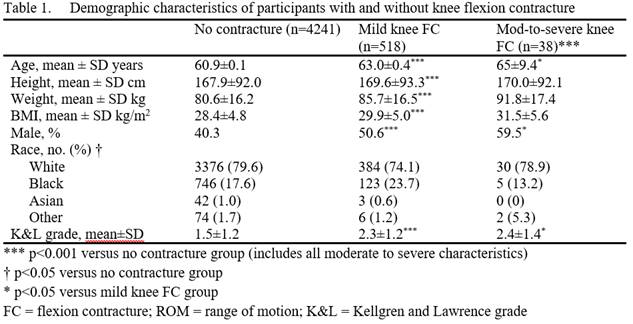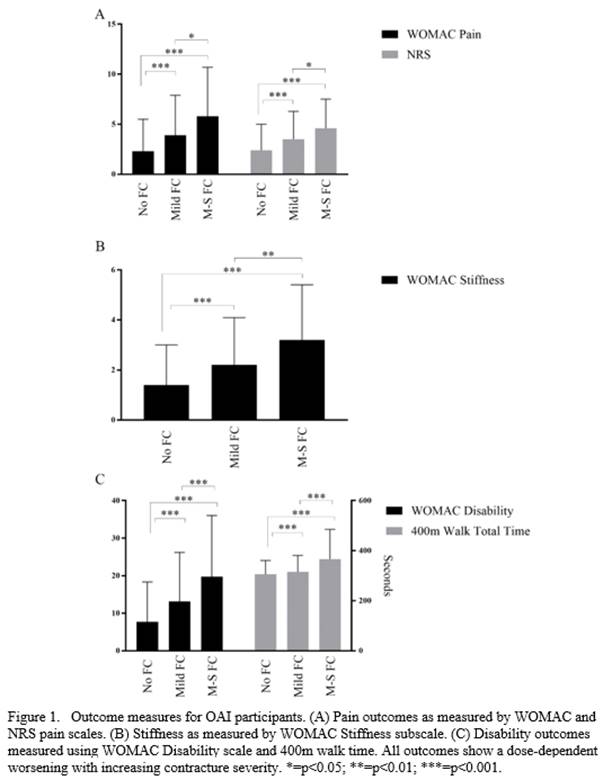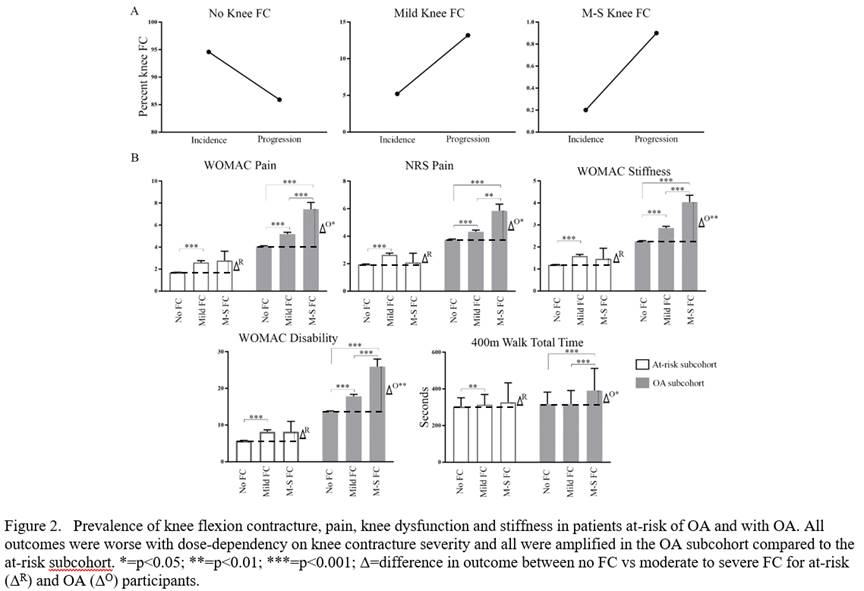Session Information
Session Type: ACR Poster Session B
Session Time: 9:00AM-11:00AM
Background/Purpose:
Knee osteoarthritis (OA) causes pain, disability, and affects ~20% of the population in the United States [Wallace 2017]. Knee flexion contractures (FCs) are limitations to knee extension [Campbell 2015]. Despite >1/3 of patients with knee OA having a FC [Ritter 2007], little is known regarding FC effect on their OA symptoms and function. Our objective was to determine if the presence and severity of a knee FC affected joint pain, stiffness and function in patients at risk of developing, or with knee OA.
Methods:
Cross-sectional study using the Osteoarthritis Initiative (OAI) cohort divided in 3 subcohorts: those at risk of knee OA (n=3284), those with radiographic knee OA (n=1390), and controls (n=122). At enrollment, knee FCs were graded based on the loss of maximum knee extension (≤5° none, 6-14° mild, ≥15° moderate-to-severe). Pain was evaluated using the Western Ontario and McMaster Universities Osteoarthritis Index (WOMAC) pain subscale and the numeric rating scale. Stiffness was evaluated using the WOMAC stiffness subscale. Function was evaluated using the WOMAC function subscale and 400m walk time. Between-group outcomes were compared using ANOVA with post-hoc testing corrected for multiple comparisons. Two-way ANOVA tested for knee FC interaction with subcohort grouping. Multiple linear regression tested for an independent association between knee FC and outcomes, correcting for age, sex, BMI, race, and radiographic severity.
Results:
Participants with knee FC tended to be older males with larger BMI and worse radiographic severity (all p<0.001; Table 1). They reported worse knee pain, stiffness and function (all scales p<0.001; Figure 1). Knee FC showed a severity-dependent association with WOMAC pain (p=0.020), WOMAC stiffness (p=0.006) and 400m walk time (p<0.001), with the magnitude increase being greater in the OA group versus those at risk of OA (Figure 2). This association was maintained following multiple linear regression (p<0.001).
Conclusion:
Knee FC was associated with pain, stiffness, and dysfunction in participants at risk of, and with knee OA in a FC severity-dependent manner. These associations were strongest in those with knee OA. Measuring knee extension should be a routine component of the clinical assessment. Addressing FC in clinical care may lead to better OA outcomes.
To cite this abstract in AMA style:
Campbell TM, Monsour M, Trudel G. Flexion Contractures Are Associated with Worse Pain, Stiffness, and Function in Patients with Knee Osteoarthritis [abstract]. Arthritis Rheumatol. 2018; 70 (suppl 9). https://acrabstracts.org/abstract/flexion-contractures-are-associated-with-worse-pain-stiffness-and-function-in-patients-with-knee-osteoarthritis/. Accessed .« Back to 2018 ACR/ARHP Annual Meeting
ACR Meeting Abstracts - https://acrabstracts.org/abstract/flexion-contractures-are-associated-with-worse-pain-stiffness-and-function-in-patients-with-knee-osteoarthritis/



